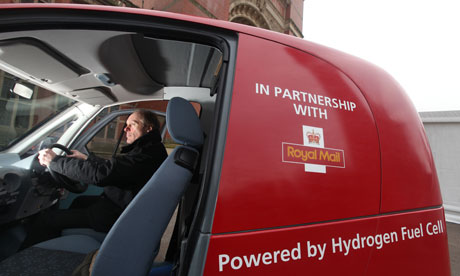What's the 'hydrogen economy'?

John Jostins who is a professor of sustainable transport design at Birmingham University drives the hydrogen powered Microcab used by Royal Mail on the Birmingham campus. Photograph: Fabio De Paola for the Guardian
The term "hydrogen economy" refers to the vision of using hydrogen as a low-carbon energy source – replacing, for example, gasoline as a transport fuel or natural gas as a heating fuel. Hydrogen is attractive because whether it is burned to produce heat or reacted with air in a fuel cell to produce electricity, the only byproduct is water.
Hydrogen is not found in pure form on Earth, however, so it must be produced from other compounds such as natural gas, biomass, alcohols or water. In all cases it takes energy to convert these into pure hydrogen. For that reason, hydrogen is really an energy carrier or storage medium rather than an energy source in itself – and the climate change impact of using it depends on the carbon footprint of the energy used to produce it.
One of the most potentially useful ways to use hydrogen is in electric cars or buses in conjunction with a fuel cell which converts the hydrogen into electricity. Fuel cells are attractive because they're far more efficient than the internal combustion engines they can replace – though the latter can still be used with hydrogen fuels if desired.
At the moment, hydrogen is most commonly produced from natural gas. In this situation, a typical fuel cell car generates 70–80g CO2 for each kilometre driven – similar to a modern gasoline hybrid or to a battery electric vehicle charged with today's UK grid electricity. These emissions can be reduced towards zero if the hydrogen is produced using low-carbon electricity sources such as renewables, nuclear or CCS to electrolyse water. The downside is that in this situation only around half as much electricity comes out of the fuel cell as was put in to produce the hydrogen in the first place. The rest is lost as heat.
Partly for this reason, and partly due to concerns over the commercial readiness of hydrogen fuel cell cars, battery-based electric cars have received more attention in recent years than hydrogen cars. However, hydrogen vehicles retain a number of important advantages: they can be rapidly refuelled in just a couple of minutes and have a range of many hundreds of kilometres. So the best technology depends on the final cost, carbon mitigation potential, and consumer needs in each case.

No comments:
Post a Comment